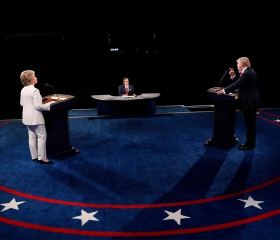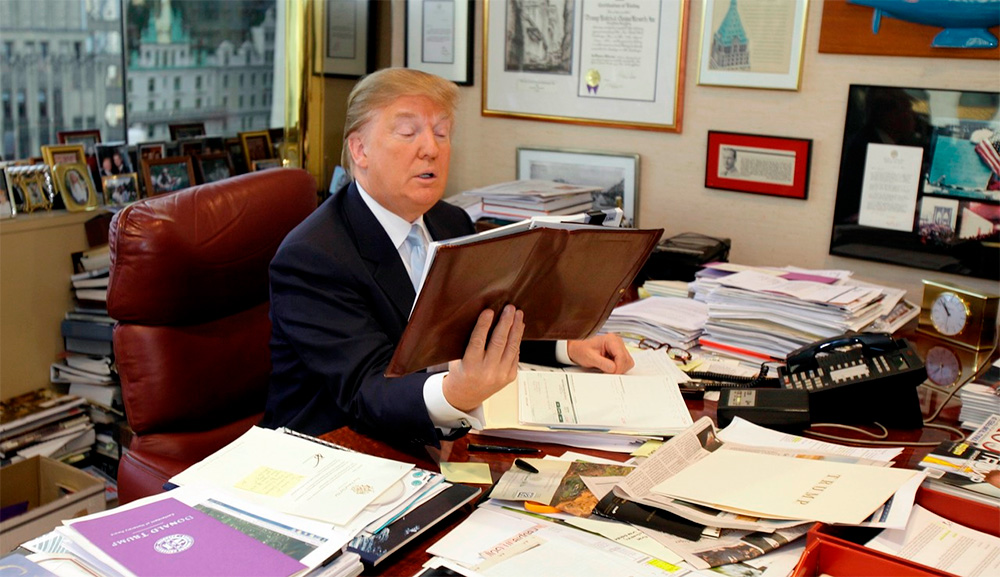With Donald Trump coming to power in the United States, the likelihood of a paradigm shift in foreign policy remains low. Judging by the declared conceptual objectives of his foreign policy, it is Donald Trump and not Hillary Clinton who will serve as the true heir to Barack Obama. In this regard, the experience gained by the 44th president of the United States is illustrative when forecasting the prospects of whether Trump will fulfil the promises he made in his election campaign.
With Donald Trump coming to power in the United States, the likelihood of a paradigm shift in foreign policy remains low. Judging by the declared conceptual objectives of his foreign policy, it is Donald Trump and not Hillary Clinton who will serve as the true heir to Barack Obama. In this regard, the experience gained by the 44th president of the United States is illustrative when forecasting the prospects of whether Trump will fulfil the promises he made in his election campaign.
During the election campaign in the United States, both enemies and allies of Hillary Clinton repeatedly painted her future administration as a “third term for Barack Obama”. Despite criticizing certain steps taken by the current administration (above all the agreements to establish the Trans-Pacific Partnership), the former secretary of state presented herself as a successor to the country’s current leader. Clinton and her supporters highlighted the similarity of the basic political beliefs of the Democratic Party leaders as opposed to the ideological disunity of the Republicans.
In contrast, Donald Trump regularly attacked the ruling administration during his campaign. His rhetoric included both personal attacks on Barack Obama as well as accusations of his policies being flawed. As the bitterness increased in the election race, the paradoxical proximity of the Republican candidate’s rhetoric disappeared along with the target of his criticism on matters of international strategy. The foreign policy postulated by Donald Trump looked much more like the programme of Barack Obama than the declarations made by Hillary Clinton, who had battled the latter for the presidency eight years ago.
Against the backdrop of George W. Bush’s failed offensive strategy, the “regime change” policy and forced democratization in the Middle East and in other regions of the world in 2008, Democratic candidate Barack Obama at that time called for establishing cooperation with other power centres (such as China and Russia) and rejecting interventionism and excessive reliance on military power. In 2016, Donald Trump advocated similar values of strategic restraint and a prudent foreign policy.
In contrast, his opponent Hillary Clinton served as a mouthpiece of the liberal-interventionist mainstream throughout the entire election campaign. The Democratic candidate promised the liberation of Syria from Bashar Assad’s regime, further support for democratic forces in Ukraine and continued resistance to Russian aggression. Based on her declared conceptual objectives in foreign policy, it is not her but Donald Trump who is the true heir to Barack Obama.
In this capacity, he is not so much a “black sheep” as the media tries to portray him since he is the latest representative of an established national tradition. Discontent is seen regularly among the American public with the exceedingly costly strategy of intervening in the affairs of regions whose problems have little to do with the interests of a substantial part of the country’s population. Even though ideas of isolationism in its purest form in the contemporary United States are not particularly widespread, the desire for greater pragmatism from the standpoint of the “average American” is seen quite frequently in public debates.
Moreover, within the intellectual establishment the logic of foreign policy restraint has been framed as a concept of “offshore balancing”. In this sense, many of the ideas advocated by Donald Trump (and previously Barack Obama) are largely consistent with the position of American intellectuals, who fall in the realist camp of foreign policy thinking, such as John Mearsheimer, Barry Posen and Stephen Walt.
Given the parallels that can be traced back to the election campaign rhetoric of Barack Obama and Donald Trump, the experience gained by the 44th president of the United States is illustrative when forecasting the prospects of whether the new White House resident will fulfil his promises.
During the early stages of the Democratic administration’s rule in 2009, attempts were indeed made to improve relations with China and Russia. The atmosphere of bilateral meeting improved considerably. Special bilateral commissions responsible for developing multi-format cooperation were established on both sides. In addition, under Obama’s leadership, the United States has refrained from embarking on any new long-term armed conflicts. Finally, Washington’s great flexibility has enabled it to reach agreements on the Iranian nuclear programme and commence the process of normalizing relations with Cuba.
However, the policy of restraint has not become the dominant force in U.S. foreign policy. The United States continued the war in Afghanistan, contributed to the destruction of the Libyan state, sponsored enemies of the Assad government in Syria and yet again sent troops to Iraq (this time to battle ISIS).
Relations with Russia have reached their lowest point since the mid-1980s. As a result, the trend seen over the previous two decades of a reduction in the military presence in Europe has come to an end. On the contrary, the U.S. military is now building new infrastructure (albeit highly limited) throughout all of Central and Eastern Europe.
Washington’s attempts to establish cooperation with Beijing, while not resulting in as serious as the rupture with Moscow, also proved to be short-term. They evolved into a “pivot towards Asia” which was clearly aimed against China as well as a military-political “rebalancing”. As a result, there have been a growing number of diplomatic altercations and incidents involving both sides in the South China Sea in recent years with military and naval forces getting dangerously close to one another.
Obama’s interview with Atlantic magazine in spring 2016 demonstrated that the American leader has not given up the views that he had in the 2008 election. In some cases, he managed to rein in the most dangerous initiatives that threatened an escalation in conflicts, such as expanding weapons supplies to Ukraine as well as carrying out air strikes and creating no-fly zones in Syria. Nevertheless, he was unable to overcome the dominance of liberal-interventionist logic in the U.S. strategy in the international arena.
Even if Donald Trump is truly committed to the plans that he declared during his campaign, he will encounter just as much resistance against attempts to pursue a realist policy than his predecessor. The liberal-interventionist model of foreign policy is not only rooted in the political establishment and the institutional culture of the national bureaucracy. The public coalition that carried the Republican candidate to power fully shares the belief in American exceptionalism, which gives rise to Messianic aspirations in the U.S. international strategy.
In this regard, the information leaked to the press about the potential candidates for the new U.S. secretary of state is quite revealing. The most often mentioned names include chairman of the Senate Committee on Foreign Relations Bob Corker. Not a big fan of Russia (he lobbied for tougher sanctions against Moscow and sponsored legislation to support Ukraine in 2014), Corker also supports prudence in the international arena and limiting interference in the internal affairs of other nations.
However, the other two most frequently cited candidates – former House of Representatives speaker Newt Gingrich and former U.S. ambassador to the United Nations John Bolton – are closer to neo-conservatives in their views and are by no means isolationists. Not surprisingly, both of them in recent years have been affiliated with the same analytical centre (the American Enterprise Institute), which played a significant role in preparing foreign policy ideas for the administration of George W. Bush.
The final choice for head of the U.S. State Department will not necessarily be confined to these individuals, but the pool of candidates itself confirms that with Donald Trump’s victory the battle among interventionists and realists has not concluded with the latter’s victory. It is only intensifying. In fact, each of the American presidents in the post-Cold War era (Bill Clinton, George W. Bush, Barack Obama and now Donald Trump) campaigned for reducing U.S. involvement in international affairs, but the liberal-interventionist lobby has invariably proved to be stronger thus far.
Will the new U.S. leader be able to overcome the long-standing evolutionary pattern of the ruling administrations, from speeches in favour of restraint to the practice of heavy involvement in international affairs? On 8 November, the Republican candidate won the elections despite the fact that he was regarded as only having a slight chance (influential analyst Nate Silver estimated the probability of a Trump victory at 29%, while other analysts had even lower figures). This would seem to give cause for optimism. But the likelihood of a paradigm shift in foreign policy actually remains low.
The advantage held by supporters of the liberal-interventionists is not only related to special aspects of the views of the national elite or the strategic culture of the country – it has a fundamental nature. This advantage is due to the magnitude of both U.S. material domination as well as positional domination over potential competitors in the international arena. Such a gap creates the risk of strategic irresponsibility.
Meanwhile, the internal political dynamics in the United States (as, indeed, in any other country) encourage national leaders to regularly demonstrate resolve in the international arena. Inaction during crises, even those that are far removed from strategic U.S. interests, gives rise to accusations of weakness and spinelessness against the ruling administration of the “indispensable nation”.
Apparently, such logic will continue to fuel the interventionist slant in the U.S. foreign policy in coming years. At least until China emerges as a real competitor to American domination. For now, not even the individuality of the most unconventional president of the United States gives reason to anticipate a fundamental change of course in the U.S. strategy. Just like Barack Obama, Trump will most likely only be able to have a corrective effect on the logic of American behaviour.







